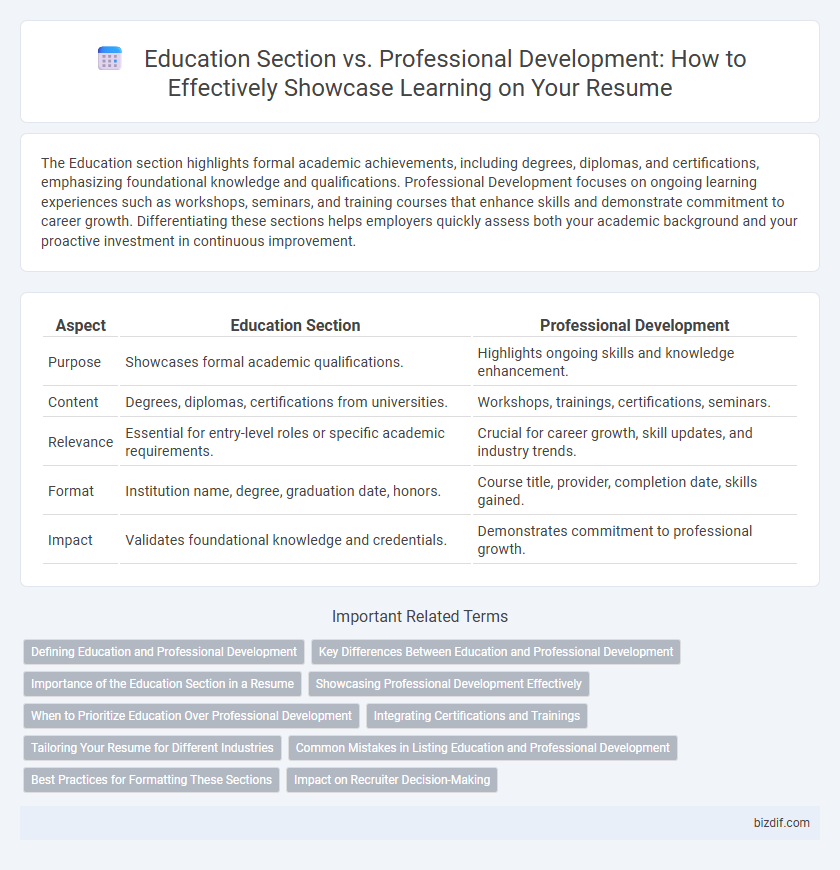The Education section highlights formal academic achievements, including degrees, diplomas, and certifications, emphasizing foundational knowledge and qualifications. Professional Development focuses on ongoing learning experiences such as workshops, seminars, and training courses that enhance skills and demonstrate commitment to career growth. Differentiating these sections helps employers quickly assess both your academic background and your proactive investment in continuous improvement.
Table of Comparison
| Aspect | Education Section | Professional Development |
|---|---|---|
| Purpose | Showcases formal academic qualifications. | Highlights ongoing skills and knowledge enhancement. |
| Content | Degrees, diplomas, certifications from universities. | Workshops, trainings, certifications, seminars. |
| Relevance | Essential for entry-level roles or specific academic requirements. | Crucial for career growth, skill updates, and industry trends. |
| Format | Institution name, degree, graduation date, honors. | Course title, provider, completion date, skills gained. |
| Impact | Validates foundational knowledge and credentials. | Demonstrates commitment to professional growth. |
Defining Education and Professional Development
The Education section in a resume highlights formal academic qualifications such as degrees, diplomas, and certifications earned from recognized institutions, serving as proof of foundational knowledge and credentials. Professional Development encompasses ongoing training, workshops, seminars, and courses aimed at enhancing skills, industry knowledge, and career growth beyond formal education. Clearly differentiating these sections ensures recruiters quickly identify both formal education credentials and continuous learning efforts relevant to job performance.
Key Differences Between Education and Professional Development
The Education section of a resume highlights formal academic qualifications such as degrees, diplomas, and certifications obtained from accredited institutions, whereas the Professional Development section emphasizes ongoing training, workshops, seminars, and courses undertaken to enhance job-related skills. Education typically reflects foundational knowledge acquired, while Professional Development demonstrates a commitment to continuous learning and skill advancement relevant to current industry standards. Employers often view the Education section as an indicator of baseline expertise, with Professional Development showcasing adaptability and proactive career growth.
Importance of the Education Section in a Resume
The Education Section in a resume highlights formal academic achievements, degrees, and certifications that validate a candidate's foundational knowledge and qualifications. This section often serves as a critical screening criterion for employers, especially in industries requiring specialized credentials or licenses. Emphasizing relevant educational background strengthens credibility and increases the chances of passing applicant tracking systems (ATS) that prioritize key educational keywords.
Showcasing Professional Development Effectively
Highlighting professional development in a resume goes beyond listing formal education by emphasizing relevant certifications, workshops, and training that demonstrate continuous skill enhancement. Clearly categorizing these experiences in a dedicated "Professional Development" section helps recruiters quickly assess your commitment to growth and industry knowledge. Including quantifiable outcomes or specific skills acquired during these programs further strengthens your profile and showcases your readiness for evolving job roles.
When to Prioritize Education Over Professional Development
Prioritize the Education section over Professional Development when applying for entry-level positions or roles that require specific academic credentials, such as degrees or certifications. Highlighting formal education proves foundational knowledge and qualifications, especially when professional experience is limited. Employers in industries like engineering, healthcare, and academia often emphasize academic achievements as a critical hiring factor.
Integrating Certifications and Trainings
The Education section highlights formal degrees and academic achievements, establishing foundational knowledge and qualifications. Professional Development focuses on certifications, workshops, and specialized training that demonstrate ongoing skill enhancement and industry-specific expertise. Integrating certifications and trainings within the Professional Development section emphasizes continuous learning and adaptability, which are crucial for career advancement in dynamic fields.
Tailoring Your Resume for Different Industries
Tailoring your resume for different industries requires clearly distinguishing the Education Section from Professional Development to highlight relevant qualifications. The Education Section should focus on formal degrees, certifications, and academic achievements pertinent to the job, while the Professional Development area emphasizes workshops, trainings, and industry-specific courses that demonstrate ongoing skill enhancement. Customizing these sections based on industry demands, such as technical fields valuing certifications or creative sectors prioritizing specialized workshops, increases the resume's impact and relevance.
Common Mistakes in Listing Education and Professional Development
Common mistakes in listing education and professional development include mixing incomplete or irrelevant courses with formal degrees, which can confuse hiring managers and weaken the resume's impact. Overloading this section with outdated certifications or non-specialized workshops dilutes the candidate's core qualifications and reduces overall clarity. Properly distinguishing between accredited educational achievements and professional development activities enhances resume effectiveness and clearly demonstrates continuous learning commitment.
Best Practices for Formatting These Sections
Separate the Education and Professional Development sections to highlight academic credentials and ongoing skill enhancement distinctly. Use consistent formatting with clear headings, chronological order, and concise descriptions that emphasize relevant degrees, certifications, workshops, or training programs. Prioritize quantifiable achievements and dates to improve readability and ATS optimization, ensuring each section supports your overall career narrative effectively.
Impact on Recruiter Decision-Making
The Education Section provides recruiters with foundational qualifications and academic achievements, establishing candidates' baseline expertise and suitability for a role. Professional Development highlights ongoing skill enhancement and industry-relevant training, demonstrating commitment to growth and adaptability in dynamic work environments. Emphasizing both sections effectively influences recruiters by showcasing a balance of formal education and continuous learning, which strengthens candidate appeal.
Education Section vs Professional Development Infographic

 bizdif.com
bizdif.com